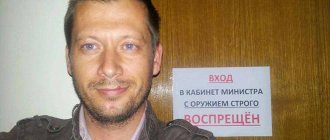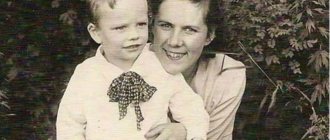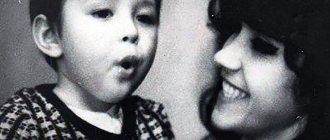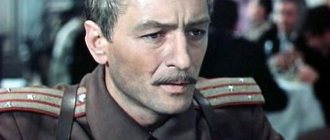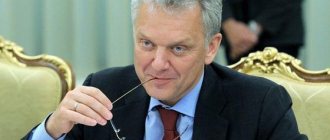Biography of Alexander Tkachev
Alexander Nikolaevich Tkachev - head of the Ministry of Agriculture, ex-governor of Kuban, member of the Bureau of the Supreme Council of United Russia, former State Duma deputy and director of a feed mill, which was one of the two base enterprises during the creation of Agrocomplex, the largest holding company owned by the family business empire official
In 2020, relatives of the head of the federal department entered the top five largest domestic owners of agricultural land. Under their control were more than fifty farms and a land bank with a volume of at least 450 thousand hectares.
Tkachev Alexander Nikolaevich
During the period of the minister’s governorship, the revenue of the aforementioned agricultural holding controlled by them increased more than 30 times (up to 27 billion rubles). Moreover, the family’s interests included not only agricultural business, but also a retail chain of more than 500 stores, a motor vehicle fleet with a fleet of 900 vehicles and 800 units of special equipment, road construction, construction of residential and commercial real estate, and so on.
Childhood and family of Alexander Tkachev
The future high-ranking official was born on December 23, 1960 in the center of the Krasnodar Territory, in the village of Vyselki, located one hundred kilometers from the administrative center. He became the second son in the family of Nikolai Ivanovich, deputy chairman of the district executive committee, who later headed a local plant for the production of feed for farm animals, and also worked in key positions in the family company. His wife, Lyubov Sergeevna, owned a farm specializing in growing grapes.
Alexander Tkachev in his youth
Alexander was 3 years younger than his brother Alexei. At school he was a good student and loved basketball. He was interested not only in sports, but also in music - he learned to play the guitar, not without the help of his brother, who studied in a music studio. After graduation, he continued his education at the Krasnodar Polytechnic Institute.
Achilles
Views: 1,438
Lately, so much righteous anger has been poured into Archpriest Andrei Tkachev that I wanted to say something in his defense.
The number of absurdities said by this priest is off the charts, so much so that thoughts involuntarily arise: the priest himself is not doing well.
I have an unfounded, but very explanatory assumption, based on a single personal meeting: perhaps the priest has a problem with alcohol.
And also star, media disease. It does not interfere.
In order to demystify the image of Fr. Andrey Tkachev, let's imagine the politician Zhirinovsky or movie characters performed by actors Sergei Garmash, Alexander Bashirov, Roman Madyanov. We're not annoyed by their hysterics on camera, are we? On the contrary, the viewer only expects them to conform to their usual role.
The key word here is “in frame.” No wonder the Saratov priest (abbot Nektary Morozov - editor's note), quoted in Protodeacon Andrei Kuraev's LiveJournal, called Tkachev a project. That's right - a media television project. On Tsargrad, especially on Channel One, the temperature of passions can be even higher.
After all, Fr. Andrey is not being rude to you. It's not your wives he's insulting. All the abuse is absolutely unaddressed. He gets excited, looking into the dark glass peephole at the operator’s command: “We’re working!” Ether!" With a clear conscience, you can always press the remote control button or the cross at the top of the window. And the priest, after the operator commands “Cut!” and the microphone is unhooked from his cassock, will be left alone with himself and his everyday, completely human problems.
But how is it possible in a sermon... in the priesthood? There's nothing to be done, that's the type.
Did collective condemnation help the “miracle worker” Archpriest Vladimir Golovin from Bolgar? Not noticeable.
And what about priest Alexy Moroz, the creator of the encyclopedia “I Confess Sin, Father,” who, as we know, beat off his wife in a family of devoted spiritual children and, because of a second marriage, was forced to move to an alternative jurisdiction? No, he is still a formidable accuser, and even introduces himself as a psychologist.
Let's assume that Tkachev is punished. They will be banned and deprived of the right to wear priestly robes. What if he starts walking naked in the cold and throwing raw meat at VIP officials? Fans of his acting talent will shed tears and then demand his canonization as a holy fool. By the way, yes, the holy fool must irritate in order to reach their hearts...
In a word, the whole problem is that Tsargrad does not put the 18+ logo on Tkachev’s programs. And another 40-minus, for especially impressionable women.
But why do we, representatives of other categories, still watch Tkachev as a horror movie, choking on popcorn on the steepest turns? Because it affects not only aging ladies. He also exploits our fears. The fear that on an ordinary Sunday afternoon before the start of the liturgy we will approach the lectern for confession and suddenly hear... something like this...
Unfortunately, this is not excluded either. Father may look much nicer, and not be at all rude, but...
Recently, in a learned and very respectable audience, the author had the opportunity to hear a story about confession. Without naming names, therefore, without divulging secrets. An elderly woman, a professor, a doctor, say, in economics, did not check the tests on time. The students were unhappy, they were in a hurry to find out the grades. The professor told them that she only checked half of it and didn’t have time to do more. But she didn't actually check any of the work, she just had to lie in an attempt to save face. A week later, for the next lesson, all grades were completed.
Soon the professor went on a pilgrimage to the monastery and went to confession to a famous elder. And he, for cheating with test papers... excommunicated her from Communion. This is an educational measure.
I wonder if the elder had any idea what kind of control these were, and how important these pieces of paper were? What did he want to achieve from a teacher of a humanities subject? Always tell the truth? (And he probably excommunicated the working men before they stopped swearing.)
Or not say such little things in confession? But how, “if you hide something... it’s a pure sin for you.”
Not every sin deserves penance. Just saying some things is a punishment in itself, although in essence they are almost innocent. Sorry for the physiological example (after Tkachev, nothing can spoil it), but what if in a public toilet you accidentally urinated on the toilet lid? And there was no paper to eliminate the damned drops? A normal person will remember the devil in his heart and try to forget about the incident. And the devil will begin to remind him of it just before confession: “It’s the sin of Imasha.” And no excuses or euphemisms like “added more work for the cleaners” will work.
A person with a medical education will assume that this is not a trait at all, but symptoms of neurasthenia or some other pre-psychopathological disease. But that’s how it is, confession is a neurasthenic and psychologically traumatic situation in itself.
I suspect that Russian priests, who receive dozens of lay people a day, hear such nonsense quite often. The Greek ones are probably less common: specially appointed confessors confess there and once every few years, they don’t run to them with such trifles. Even rarer are the ancient Christians, for whom confession was a reunion with the Church, a “second baptism.”
After all, in essence, this is a profanation of the sacrament, because, when a sinful act is resolved “legally,” it does not lead to metanoia, a change of consciousness, or work on oneself.
So to speak or not to speak? I’m afraid that even an experienced confessor will not give an unambiguous answer to this question.
The trouble is that it is much easier for a person to call himself an “asshole” than to identify something that really requires work, correction, and mental effort. Quarrels with family, pride and laziness pale in front of such sinful microbes, swollen to the size of an elephant, certainly terrible and burningly shameful. Before the Chalice, such a penitent will really see himself as the worst of all, the first sinner, but what’s the point?
After all, trying to find logic in a situation of cognitive dissonance can be the first step towards insanity. And woe to the religious tradition if it canonizes crazy logic. Because a Christian still cannot simply “stop worrying and start living,” as the American psychologist advised. And even the most idiotic suspiciousness is a manifestation, albeit sick, but still of conscience.
So the Tkachevs, collecting hype in this bleeding field, earning their authority from this, will always exist in the church environment. Always, as long as sin exists in us, and we have to fight with it. It is important not to forget that what is impossible for humans is possible for God, of whom we partake (become a part) in the sacrament of the Eucharist.
However, it is also important to learn to press the remote control button in time when Tkachev appears on the TV screen, and the cross if he appears to us on the Internet. And if you don’t throw away the brochures about sins, then put them on the mezzanine in the last row, so that it would take no less effort (only physical) to get them.
And yet, sometimes I think, it would be nice to have a psychoneurologist on the church staff, preferably in the priesthood. So that in especially difficult cases he would “forgive and resolve” complexes formed both by overzealous confessors and by the laity themselves, at the same time prescribing pills. Not a lobotomy.
However, then the “spiritual clinic” would risk turning into a real madhouse.
Drawing by Vyacheslav Polukhin
The beginning of the career of Alexander Tkachev
Having received an engineering degree in 1983, the young specialist returned home and worked for three years at the plant run by his father. Then he switched to Komsomol work with the support of the secretary of the district party committee Alexei Klimov, a friend of his father, and until 1988 he was the first secretary of the district Komsomol committee of the village, and joined the Communist Party.
Alexander Tkachev headed the plant at the age of 30
At the age of 30, Alexander took over his father’s position and became the director of the plant, Nikolai Ivanovich himself continued to work, but as a deputy director. In 1991, he left the ranks of the CPSU. After 3 years, Alexander’s family became the owner of the plant, buying privatization certificates and land shares from the workers and creating.
Entrepreneurs were actively engaged in agricultural business, absorbing neighboring agricultural enterprises and annexing new lands.
Departure to Russia
In 2014 Tkachev moves to Moscow. This happened at a time when, against the background of the escalation of the conflict between the Russian Federation and Ukraine, relations between the patriarchates of these countries worsened. In the capital of Russia, he ended up in the temple of Moscow University, after which he became a cleric of the Church of the Resurrection of the Word. However, the St. Basil the Great gymnasium near Moscow was designated as the main place for his ministry.
Upon arrival in Moscow, Andrei continued to successfully combine church service and authorship - writing books and articles for magazines. He also did not give up performing on television, becoming the host of his own program on Tsargrad. And in 2020 the priest was appointed full-time cleric of the Cathedral of St. Basil the Great.
Archpriest during a radio broadcast
The worldview and activities of Andrei Tkachev can be treated differently, but the fact remains that he is a very famous person. Therefore, many are interested in learning more about the biography, family, wife and children of the archpriest.
Alexander Tkachev in politics
In 1994, the successful director of Agrocomplex began building his political career.
Initially, he was elected as a deputy of the regional legislative assembly, and in 1995 he entered the State Duma, ahead of the Communist Party candidate Nikolai Kondratenko. Moreover, initially he allegedly belonged to the ranks of Chernomyrdin’s political party “Our Home is Russia” and was supported by it. But the deputy himself denied this assertion. In parliament, he joined the Agrarian Group, which occupied a position close to the Communist Party of the Russian Federation.
In 1996, the young politician decided to nominate his candidacy for the post of head of the region, again competing with Kondratenko. But before the elections he withdrew from the “race” in favor of the current governor Yegorov. The reason was a lawsuit that arose regarding the legality of several grain elevators joining the Agrocomplex. As a result, the case in court was resolved in favor of Tkachev, and Kondratenko took the desired post.
In 1999, he supported the candidacy of Alexander Nikolaevich in the parliamentary elections, and he won, becoming deputy chairman of the relevant deputy group.
Alexander Tkachev - Governor of the Krasnodar Territory
In 2000, with the support of the former head of the region, who publicly announced him as his successor, Alexander Bal was elected head of the “granary of Russia.” The new head of administration immediately invited the ex-governor to represent the interests of the region in the Federation Council. Later he became famous for pursuing a nationalist policy with the slogan “Kuban - for the Kuban people!”
In 2004, Tkachev was confirmed as governor for a second term. While in office, he initiated a massive reconstruction of the central part of the city of Krasnodar. In 2007, the official was elected governor again.
Personal life of Alexander Tkachev
The head of the department is married to his peer and fellow villager Olga Ivanovna. She is an economist, like her husband, and received a higher education, but, unlike him, in Rostov-on-Don. Then she worked at a leather goods factory in Krasnodar. The married couple raised two daughters - Tatyana, born in 1983, and Lyubov, born in 1994.
Alexander Tkachev with his wife Olga
Lyuba was fond of painting. And the eldest daughter graduated from the Agrarian State University in Krasnodar. In 2006, she became the wife of Roman Batalov, a young man originally from Krasnoyarsk who graduated from MGIMO (where he met his wife). Immediately after his marriage, the young man became deputy chairman of the land relations committee in the Legislative Assembly of the region and deputy director of Krasnodargorgaz. In 2009, he defended his PhD thesis and became the owner, recognized in 2020 as one of the largest grain exporters in the world.
Alexander Tkachev with his daughter Tatyana
Almost the entire large business of the region was under the control of Alexander Nikolaevich’s family. In particular, Anastasia, the daughter of his older brother Alexei, became a billionaire at the age of 22 and co-owner of pipe factories, the largest poultry farm in the area, a development company and other assets.
According to the income statement for 2014, the official owned a residence in the center of Krasnodar - a house with an area of more than 900 square meters with a land plot of 1.85 thousand square meters. According to unofficial information in the media, the Tkachev couple also owned an apartment in an elite building worth about 2.5 million rubles, an estate with a mansion on Ilyinskoye Highway, valued at $1.5 million, as well as living space in the capital.
Family of Alexander Tkachev
They were also leasehold owners of land plots near Tuapse, with an area of about 1 thousand and about 10 thousand square meters. The property became notorious when activists dismantled a section of fencing and discovered that endangered pine trees had been cut down. After the incident, environmentalist Evgeniy Vetishko was sent to a settlement colony for 3 years for damaging property by a court decision. Alexander Tkachev's dacha in Gelendzhik Among the personal residences (except for the above-mentioned recreation center in Blue Bay) is the estate in the official's homeland (officially they are considered the property of Agrocomplex). On a plot of 500 hectares there is a master and guest house, tennis courts, shooting ranges, swimming pools, artificial waterfalls, a stable, that is, everything necessary for a comfortable life and receiving distinguished guests. The owners even plan to breed sturgeon, trout and pheasants, which they offer to hunt.
Moving to the capital
In 2005 a clergyman moves with his family to the capital of Ukraine. There he has the opportunity to take part in television programs with spiritual content.
He had no direction to any particular church. For this reason, he carried the word of God wherever he could. Mainly in places where Andrei was invited by familiar clergy. Thanks to the initiative parishioners, Tkachev was accepted into the church of St. Agapit of Pechersk and became the rector of the parishioners, serving for eight years.
Interesting! During this time, he hosted several programs on the Orthodox channel. His sermons could also be heard within the framework of one of the projects, which was broadcast on the Era FM radio.
Soon Andrei Tkachev becomes the author of the Ionian Monastery magazine, a columnist for the Segodnya newspaper, and also a journalist for an Internet project for young people called “Youth.” It should be noted that A. Yurievich is also the author of a number of books.
Interesting! When communicating with the media, Andrei Tkachev often took a “pro-Russian” position.
Andrey managed to make a career on television
In 2013 the clergyman was appointed head of the Missionary Department of the Kyiv diocese. Then he visited the United States of America and noted that this country was in the stage of “imperial decay.”
Interesting: Biography of Anatoly Sobchak: wife, children of a politician
Alexander Tkachev today
In 2012, the politician was included in the State Council under the President. He was appointed special representative of the leader of the state for Abkhazia, and was also approved for the next 5-year term as the head of Kuban. Alexander Tkachev appointed Minister of Agriculture After his appointment in April 2020 to a ministerial position in the field of agriculture, the experienced manager and politician was able to immediately prove himself and increase his apparatus weight by introducing unprecedented measures to tighten control over imported products. The actions organized by the new minister to destroy food products produced in sanctioned countries had a noticeable resonance.
